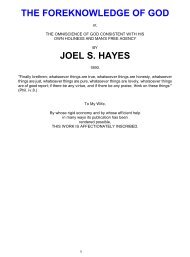Are Men Born Sinners? - Library of Theology
Are Men Born Sinners? - Library of Theology
Are Men Born Sinners? - Library of Theology
Create successful ePaper yourself
Turn your PDF publications into a flip-book with our unique Google optimized e-Paper software.
Rom. 5:12-19 does not in any way teach the doctrine <strong>of</strong> original sin. Sheldon tells us<br />
what it does teach:<br />
The Apostle here draws a comparison between the evil potency in the sinning Adam and<br />
the beneficent or saving potency in the righteous Christ...Both are pictured rather<br />
according to their tendency than according to literal fact. Surely the potency <strong>of</strong> grace in<br />
Christ does not actually come upon all men unto justification <strong>of</strong> life, but it tends to that<br />
end, and hence is so described. In like manner the evil potency in the sinning Adam is<br />
characterized according to its tendency.<br />
To interpret the phrase "made sinners" to mean that men are born sinners and become<br />
sinners involuntarily and necessarily by receiving a sinful nature from Adam, is a forced<br />
and inconsistent interpretation <strong>of</strong> this passage; for this passage not only says that all men<br />
are "made sinners" because <strong>of</strong> Adam's transgression, it also says that all men are "made<br />
righteous" by the obedience <strong>of</strong> Christ, and that the free gift <strong>of</strong> life "came upon all men"<br />
by Christ Jesus. So, for the advocates <strong>of</strong> the doctrine <strong>of</strong> original sin to arbitrarily give to<br />
the phrases "made sinners" and "came upon all men" the meaning <strong>of</strong> physical force and<br />
physical necessity when these phrases refer to Adam's sin, without giving the same<br />
meaning to them when they refer to Christ's righteousness, is once again an example <strong>of</strong> a<br />
forced and inconsistent interpretation dictated by a prepossessed belief in the doctrine <strong>of</strong><br />
original sin.<br />
Paul does not affirm an involuntary, necessary, or irresistible connection between either<br />
the sin <strong>of</strong> Adam and mankind, or the righteousness <strong>of</strong> Christ and mankind. Otherwise,<br />
verse 18 would teach the universal salvation <strong>of</strong> mankind: "The free gift came upon all<br />
men unto justification <strong>of</strong> life." We know that universal salvation is not taught in the<br />
Bible. <strong>Men</strong> are not saved involuntarily, automatically, and necessarily because <strong>of</strong> the<br />
obedience <strong>of</strong> Christ. Nor are they "made sinners" involuntarily, automatically, and<br />
necessarily because <strong>of</strong> the transgression <strong>of</strong> Adam. But the context shows that men are<br />
"made sinners" in the same way that they are "made righteous," that is, voluntarily or<br />
willingly. Rom. 5:18, 19, 21. In verse 18, Paul compares the judgment that came upon all<br />
men because <strong>of</strong> Adam with the free gift <strong>of</strong> life that came upon all men because <strong>of</strong> Christ,<br />
and says "as" the one, "even so" the other. In verse 19, he compares the way the many<br />
were "made sinners" with the way the many were "made righteous," and says "as" the<br />
one, "so" the other. And in verse 21, he compares the reign <strong>of</strong> sin through Adam's<br />
transgression with the reign <strong>of</strong> grace through Christ's righteousness, and says "as" the<br />
one, "even so" the other. The context and language <strong>of</strong> this passage require that we<br />
understand the connection between Adam's sin and the sins <strong>of</strong> the rest <strong>of</strong> mankind to be<br />
moral and voluntary instead <strong>of</strong> physical and involuntary.<br />
Paul did not teach that men are "made righteous" involuntarily through Christ, nor did he<br />
teach that men are "made sinners" involuntarily through Adam. He did not teach that sin<br />
is a substance that dwells in the flesh. He did not teach that sin is inherited from Adam<br />
through "natural generation." He did not teach that we receive a sinful nature from Adam<br />
that is the "fountain and cause" <strong>of</strong> all our "actual" sins. He did not teach that men are born<br />
sinners or that sin is transmitted physically from Adam to his descendants. All <strong>of</strong> this has






